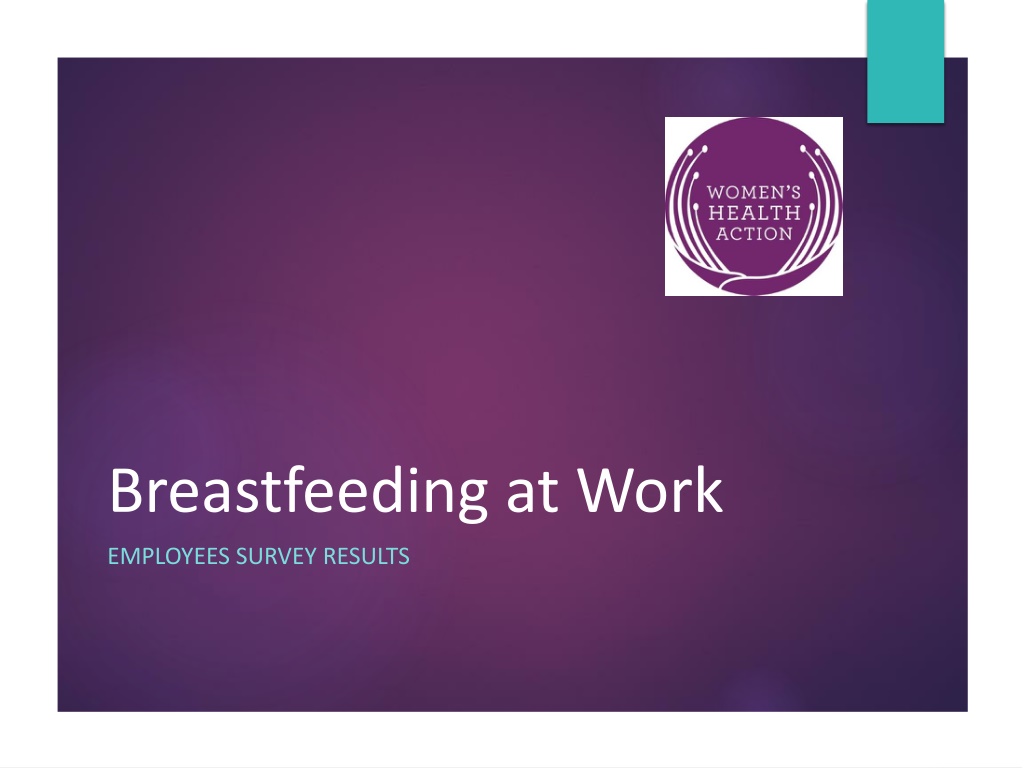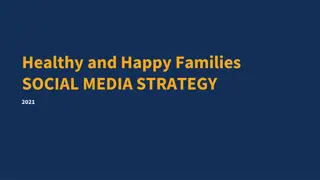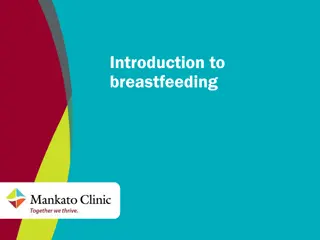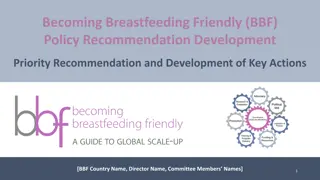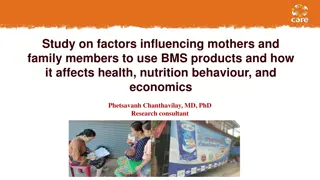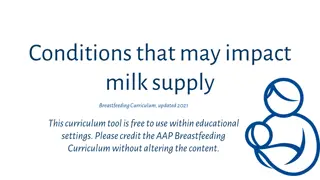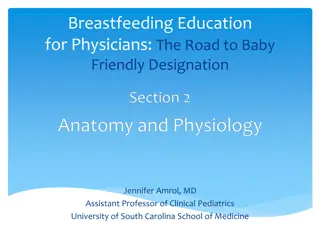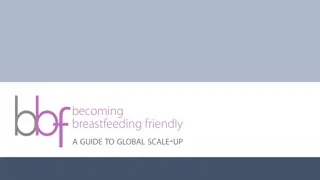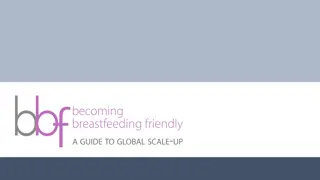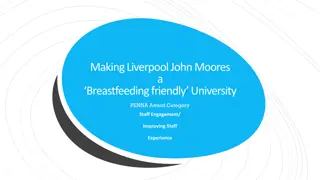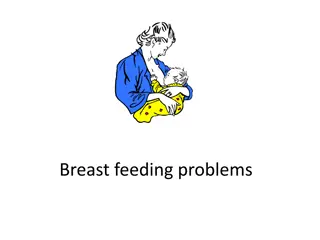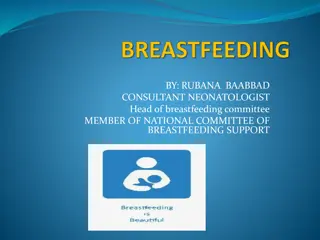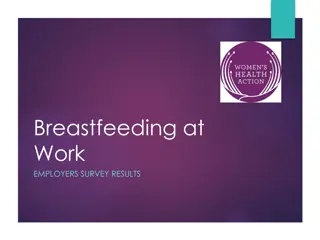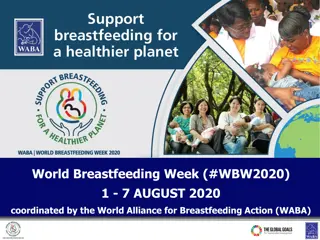Breastfeeding at Work: Employees Survey Results
Women's Health Action surveyed 527 women on their experiences of breastfeeding or expressing in the workplace. Most women managed breastfeeding and working by expressing before or after work, with 8 out of 10 respondents indicating some level of workplace support for breastfeeding mothers. Positive attitudes towards breastfeeding were rated highly by women, but spaces for breastfeeding or expressing milk were rated lower.
Download Presentation

Please find below an Image/Link to download the presentation.
The content on the website is provided AS IS for your information and personal use only. It may not be sold, licensed, or shared on other websites without obtaining consent from the author.If you encounter any issues during the download, it is possible that the publisher has removed the file from their server.
You are allowed to download the files provided on this website for personal or commercial use, subject to the condition that they are used lawfully. All files are the property of their respective owners.
The content on the website is provided AS IS for your information and personal use only. It may not be sold, licensed, or shared on other websites without obtaining consent from the author.
E N D
Presentation Transcript
Breastfeeding at Work EMPLOYEES SURVEY RESULTS
WOMENS HEALTH ACTION SURVEYED 527 WOMEN IN MAY AND JUNE 2015, ON THEIR EXPERIENCES OF BREASTFEEDING OR EXPRESSING IN THE WORKPLACE On average, survey respondents returned to work when their baby was 6 months old. Nearly two-thirds (62%) of women who answered the survey were still breastfeeding or expressing. Most (55%) were employed part-time. Most respondents identified as NZ European (95%), M ori (13%), Pasifika (3%), Asian (1%), Indian (1%) or other (10%). Most worked in health (26%), education (25%), professional, scientific, technical and administrative services (14%), retail (10%), financial and insurance services (7.1%), arts (4%), public administration (4%) or media and telecommunications (3%).
MOST RESPONDENTS MANAGED BREASTFEEDING AND WORKING BY EXPRESSING BEFORE AND/OR AFTER WORK HOW DID YOU MANAGE BREASTFEEDING AND WORKING? 74% I breastfed before and/or after work 54% I expressed breast milk at work 17% Someone brought my child to me at work 17% I went to my child to feed during breaks 16% I took my child to work with me 11% I worked from home and fed my child when I needed to n=523
8 OUT OF 10 RESPONDENTS INDICATED THAT THEIR WORKPLACE HAD SOME SORT OF SUPPORT FOR BREASTFEEDING MOTHERS WORKPLACE SUPPORT AVAILABLE FOR BREASTFEEDING OR EXPRESSING 54% Flexible hours or break times Clean, accessible and private places OTHER than a bathroom or toilet 50% A positive culture towards breastfeeding including the prevention of harassment and discrimination 47% Written information around parental leave, breastfeeding and other flexible work options policies 26% 20% A written policy to support breastfeeding employees 14% Dedicated/designated breast milk storage facilities One-fifth of respondents said that no workplace support was available A nominated liaison person to assist pregnant and breastfeeding employees 3% 20% Nothing was offered n=484
WOMEN WERE MOST LIKELY TO RATE THEIR WORKPLACES POSITIVELY ON POSITIVE ATTITUDES TO BREASTFEEDING RATING ON AVAILABLE WORKPLACE SUPPORT Positive supervisor or co-worker attitudes or support for breastfeeding women 42 4 29 17 8 Positive employer attitudes or support for breastfeeding women 43 5 25 19 8 Flexible hours or break times to accommodate breastfeeding or expressing 35 8 29 15 13 28 10 29 23 10 Suitable space to refrigerate breast milk 22 16 23 25 14 Spaces where breastfeeding women can feed their children Excellent Very good Neither good nor bad Not that good Not good at all Respondents were least likely to rate their workplaces positively on spaces to breastfeed or express breast milk n=498
4 OUT OF EVERY 10 WOMEN DID NOT DISCUSS THEIR BREASTFEEDING NEEDS WITH THEIR EMPLOYER BEFORE THEY RETURNED TO WORK HOW EASY IT WAS TO DISCUSS BREASTFEEDING NEEDS WITH EMPLOYER 53 3 31 13 Extremely easy Somewhat easy Somewhat hard Extremely hard Of those who did, most (84%) found it somewhat or extremely easy n=497
OF THOSE WOMEN WHO DID DISCUSS THEIR BREASTFEEDING NEEDS NEARLY THREE QUARTERS (72%) FOUND THE PROCESS A POSITIVE ONE. This was because: Their places of work were flexible and supportive of their needs (135 comments from 205 respondents or 66%); Their employers were female, which they felt made the process easier (21%); They knew their rights and were prepared for the discussion (12%); They had good communication with their employer, and felt the issue was an easy one to discuss (10%); and They were not the first person in their workplace to have had this discussion (8%). Note that some women made more than one comment, so percentages may exceed 100%. The percentages on this slide are based on the sample of positive comments (n=205)
Positive comments My manager was the one who asked me if I was breastfeeding or not and gave me all the information i needed to transition into work easily At the job interview I made it clear I was breastfeeding and that I would continue to breastfeed while at work, they informed me of the office specifically for that use and were very positive about it. They were very understanding and supportive of breastfeeding and they were aware of the benefits of breastmilk so they did all they could to allow me to feed I'm very confident and believe breast us best. Nothing will get in my way These women told us: My employer is father if 8 children and grandfather of 3. He talks openly about his family and raising them thus making me feel more comfortable to talk. My employers were extremely supportive and sought out the information for me before my return to work. My manager was very supportive & immediately said my husband could bring my daughter in any time she needed me & that I was welcome to use her office if I wanted somewhere private to breastfeed (My boss) has 6 kids himself and very understanding (and) supportive (he) appreciated that I had returned to work and did what he could to make it as easy as possible
FOR JUST OVER ONE-QUARTER OF RESPONDENTS, HOWEVER (29%), THE EXPERIENCE WASN T QUITE SO POSITIVE. This was because: Their employers were not supportive or understanding (37%); They felt awkward bringing up breastfeeding (37%); Their employers were male, which they felt made it a harder issue to discuss (29%); They felt like a burden, and that breastfeeding was seen as unproductive and an inconvenience (17%); and They were unsure or worried (8%), and there were no areas to express or feed (7%). Note that some women made more than one comment, so percentages may exceed 100%. The percentages on this slide are based on the sample of negative comments (n=59)
Negative comments He did not know it was my right to breastfeed at work. Another manager complained when I breastfed in the staff room one day. They were not supportive of me leaving work to go to day-care to feed my girl even though she was only a 5 minute drive away at the closest possible day-care Male dominated workplace! The best they could offer was a lockable room but it is kept cool because it's where they store the spare IT parts It felt like they thought I was requesting special treatment or more break times. These women told us: My boss is a male and didn't understand why I wanted to continue using breastmilk when I could just use formula. It was an extremely uncomfortable discussion. They were not supportive at all. Did not want to provide me with suitable options... Male colleagues felt uncomfortable discussing the topic all together... I fought a fight not only for me but other colleagues also. It worked for a few weeks but I then had to give up. If they had been more accommodating I (would have) continued breastfeeding longer They weren't able to understand why I didn't just switch to formula
MOST WOMEN WHO PARTICIPATED IN THE SURVEY WERE STILL BREASTFEEDING STOPPED BREASTFEEDING AFTER RETURNING TO WORK 1% Less than one month 6% One to three months 10% Four to six months 7% Seven to nine months 2% 10 to 11 months 12% 12 months or more 62% Still breastfeeding n=484
THERE ARE CLEAR AND SIGNIFICANT DIFFERENCES BETWEEN THE LENGTH OF TIME WORKING MOTHERS SPEND BREASTFEEDING, AND THE SUPPORT OFFERED IN THE WORKPLACE COMPARISON BETWEEN WORKPLACE SUPPORT AND LENGTH OF BREASTFEEDING 10 Nothing was offered 40 7 A nominated liaison person to assist pregnant and 0 20 Dedicated/designated breast milk storage facilities 6 43 A written policy to support breastfeeding employees 23 34 Written information around parental leave, breastfeeding 23 55 A positive culture towards breastfeeding including the 34 74 A clean, accessible and private place to breastfeed and/or 17 72 Flexible hours or break times to accommodate 37 Continued breastfeeding 12 months or more after returning to work (n=58) Stopped breastfeeding 3 months or less after returning to work (n=35)
WHAT ELSE DID BREASTFEEDING MUMS HAVE TO TELL US? Of those who chose to make a final comment One quarter (24%) told us what a positive difference it made to have a supportive work environment Just over one-fifth (22%) wanted us to know how stressful and exhausting it is to breastfeed while working 37 mums, (15%) wanted us to know about the negative impacts on breastfeeding caused by lack of facilities, lack of privacy or lack of areas to express or feed.
